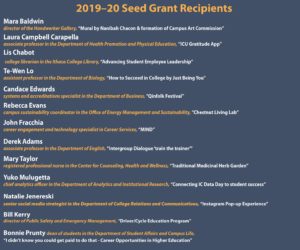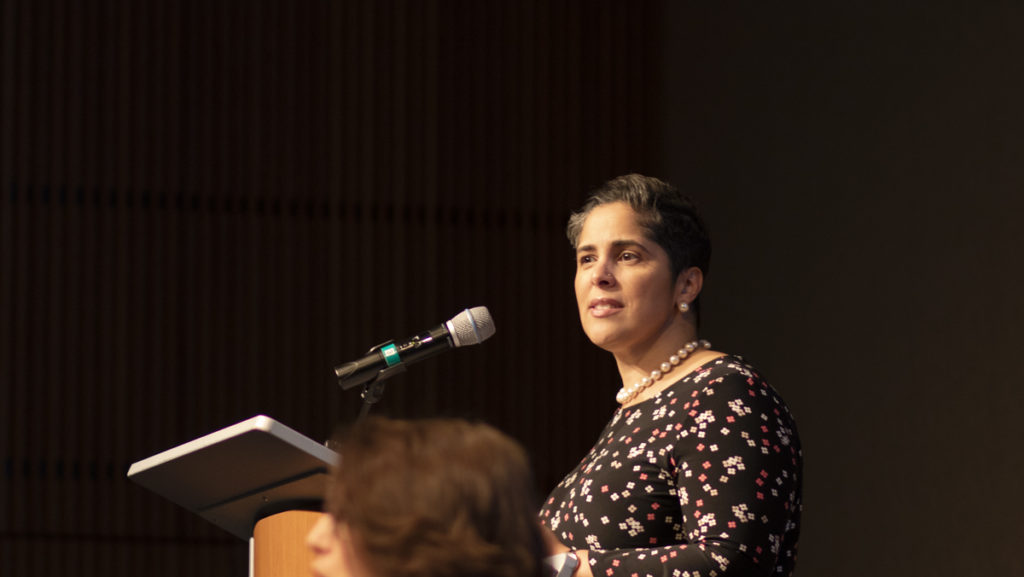Ithaca College President Shirley M. Collado addressed the campus community about upcoming changes in the budget and leadership positions at the All-College Gathering on Feb. 5.
Speaking to the staff, faculty and students gathered in the Emerson Suites, Collado discussed the 2019–20 fiscal year, ensuring that the college is planning to focus on creating a solid budget. She said the college is planning to invest in expenditures related to the strategic plan and prioritize benefits and salaries for faculty and staff. Collado plans to gear the college’s budget and resources toward benefiting the community. She said the concerns regarding the sustainability of the college’s budget model are representative of nationwide trends in higher education.
“It underscores that, really, our current financial model will need rethinking, will need retooling, will need remodeling,” Collado said. “It is possible to intentionally create investments, identify new revenue streams, build a future that’s intentional and set it on priorities that we value while still making tough decisions. And I want us to do that together. It takes your engagement and it takes your ownership, with us, to do this.”
Collado described the college as being at a crossroads, meaning that she and her team are coming up with ways to diversify revenue and commit to students and the student experience. Collado said she sees promise for the college and does not want recent changes—like the operating budget’s surplus decrease from $20 million to $5 million for the 2018–19 academic year—to instill fear in the campus community. Another element of the budget’s precariousness is that it relies heavily on student enrollment.
She also said the college is on track to have a higher number of philanthropic contributions compared to previous years. She said more than $31 million has been received so far this year, compared to the approximately $24 million in 2011.
Feb. 1 was the last day to apply to admission to the college for the incoming class, and the college has received more than 13,000 applications and has released over 67 percent of admissions decisions, Collado said. She said 55 percent of the accepted students have received a financial aid award, a factor that may encourage students to attend the college.
William Guerrero, vice president of the Division of Finance and Administration, also spoke about the college’s budget at the gathering. He said the college is 88 percent reliant on student fees, which is common for private liberal arts colleges. Guerrero showed a presentation slide about enrollment over the previous years: In the 2015–16 fiscal year, the college had 5,979 students; in the 2016–17 fiscal year, the college had 5,926 students; in the 2017–18 fiscal year, the college had 5,750 students; and in the 2018–19 fiscal year, the college had 5,797 students. It is projected that there will be 5,665 students during the 2019–20 fiscal year. He said there is a large graduating class this year, a situation that also contributes to the lower enrollment.
The revenue forecast for the 2018–19 fiscal year is $238,140,000, which Guerrero said has slightly increased from previous years. However, the college’s spending has increased as well. Guerrero said the forecast for the net operating margin is $1.6 million.
“You could say that’s a nice cushion; it shows you where we are as an institution,” Guerrero said. “What this does, it really kind of sets the stage for strategic planning and future discussions.”
Guerrero also presented the draft budget priorities, which he and the IEBC think are important to invest in for the campus community. These include a 2.5 percent compensation increase for employees, resident assistant compensation, faculty promotion, a staff compensation study, investment in software for admissions and customer relationship management, website support, growing dining and auxiliary services, the strategic plan, and the contingency, a type of financial safety net, which is 2 percent of the net revenue. These priorities are not concrete until the budget gets approved in May.
Currently, the college has $139 million of outstanding debt, as well as $30 to $40 million of debt capacity, which Guerrero said allows the college to invest in various opportunities on campus.
“Although, when you look at our operations, and it might be a little more challenged, we’re in a really, really good position to do some exciting things,” Guerrero said.
Collado also spoke about many of the leadership transitions and searches taking place within the coming months. She said the search for the vice president of the Office of Human and Organizational Development is underway. The first round of interviews with the initial candidates will take place this month and will be airport interviews, meaning that they will be conducted off-campus in a closed session. Collado said the group will get reduced to a focus size, and she anticipates that she will announce who will take over the position by the end of the spring semester.
The search for the dean of the School of Humanities and Sciences is also in process. Collado said four finalists have been selected and will be on campus for open forums with faculty, staff and students Feb. 18–21. While the schedule has been set for these visits, the identities of the finalists have not yet been released. Collado said she expects to have one of the finalists selected for the position by summer 2019.
Additionally, Collado said the Office of College Relations and Communications will move out of the Division of Institutional Advancement and will be renamed the Division of College Communications.
“This is the first stage of allowing us to do laser-focused work with the great team of institutional advancement and the great team of communications, and so, really allowing us to take these strategic pieces of the college and leverage their capacity centrally, especially as we get ready to go full force with the strategic planning process,” Collado said.
Collado did not give an exact timeline for the search for the vice president for enrollment management, but she said it will be an expedited process that will be launched soon. She said the college is looking to hire an enrollment strategist who can address the challenges and opportunities the college faces. Gerard Turbide, former vice president for enrollment management, suddenly resigned from the college in January. She assured the campus community that there are enrollment searches that occur in the spring and summer and that this is not uncommon, despite the spring semester generally being a peak time for the college admission and enrollment process.
“This is a field that is ever-changing and moving quickly,” she said. “I have all the confidence in the world that we will be able to do that effectively.”
Lastly, she said the search for the executive director for student wellness in the Division of Student Affairs and Campus Life is underway. Finalists chosen by the committee, with the help of higher education consulting firm Keeling and Associates, will be on campus Feb. 12, Feb. 14, Feb. 20 and Feb. 26 for open sessions.
La Jerne Cornish, provost and senior vice president for academic affairs, also spoke at the gathering about the strategic plan. The Strategic Planning Steering Committee announced Jan. 30 that it has chosen draft vision, mission and values statements and working group themes. Cornish said the mission of the strategic plan is to engage, explore and empower through theory, practice and performance. This mission is in reference to the college’s beginnings as a music conservatory, when the goal of theory, practice and performance was established.
“We belong to various communities individually and collectively,” Cornish said. “We know the communities to which we belong that are thriving, and those that are not. And we want to inspire bold thinking on the part of everybody that belongs to this college and beyond to create thriving communities.”
Collado also mentioned some of the highlights of the previous semester and what the campus community can expect to come next. The Ithaca College Board of Trustees will be on campus Feb. 14 and 15 to meet with the strategic planning committee for the first time, as well as with the rest of the campus community. The permanent food pantry, funded by Dave Lissy ’87, chair of the board of trustees, will be located in the DeMotte Room in the Campus Center. She did not give an exact date as to when it will open, but she urged the campus community to donate goods to the pantry. The Chair’s Academy, a program run by Cornish that brings 40 department chairs from across campus together for professional development activities, began last month. Additionally, the I Lead Ithaca Academy, a program that allows staff members and supervisors to strengthen their leadership skills, inaugurated its first cohort last month. Collado also said she continues to host lunches each month for employees new
to the college.
Colleen Barnes, administrative assistant in the Office of Judicial Affairs, and Terry Taney, engagement and constituent relations assistant in the Office of Engagement and Constituent Relations, also presented Luca Maurer, director of the Center for LGBT Education, and Outreach Services, and Jennifer Pawlewicz, career engagement and marketing specialist for Career Services, with the Fall 2018 Staff Council Recognition Award.
Collado also announced the recipients of the 2019–20 Seed Grant, a program now in its second year that allows faculty or staff members to receive funding for interdisciplinary projects. This year, faculty, staff and students were chosen for the 13 projects valued at $73,000.

A brief Q&A session followed the gathering, where an update on the Cortaca 2019 steering committee, the possibility of bringing Lime bikes to campus, staff and faculty parking tags and potential changes to the MLK Week events were discussed.
Some members of the audience found the presentation, especially the insight into the college’s finances, to be helpful. Freshman Mark Scaglione said that from a student perspective, he is hopeful for the college’s future.
“I think it’s really important in terms of financial perspective, seeing where we’re going in the coming years, and also just President Collado addressing the community and being able to speak to everyone,” Scaglione said.
Sophomore Samantha Brandal said the gathering allowed her to get a wider sense of what is happening on campus.
“It’s a good way to get people engaged and to think about the financial aspect and the broader aspects of running the campus as opposed to your particular life on the campus,” she said.
Collado said the highlights from the previous semester and the promise of the strategic plan should make the campus community feel confident in the future of the college.
“That is going to be, and is a monumental opportunity, and it’s happening right now, to fulfill the promise of IC,” she said. “And I don’t want our enthusiasm or our excitement about this moment to be dampened by worries of job security, benefit salary, or the college’s solvency. We can move forward into the future with great strength and intentionality.”
Staff writer Laura O’Brien contributed reporting.
Correction: A previous version of this article stated that the college’s operating budget has decreased from $20 million to $5 million. It has been corrected to say that this is the college’s operating budget surplus.









